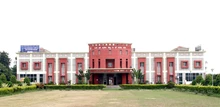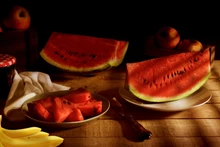
In the heart of Rourkela, Sundargarh, where farming often meant toiling relentlessly for meager returns, Hirod Patel, a 32-year-old farmer from Ratanpur, has emerged as a beacon of innovation and success.
Breaking away from the conventional approach to agriculture, Hirod has pioneered an Integrated Farming System (IFS) that blends horticulture, paddy farming, and pisciculture, with a unique twist – cultivating climbing vegetables over farm ponds.
Hirod's journey into agriculture began as a return to his roots. Born into an agrarian family, he explored various vocations before deciding to assist his father, Shiva Shankar, in farming. His farm spans 14 acres, including two acres on lease. While ten acres are dedicated to a diverse range of activities like horticulture, pisciculture, poultry, dairy farming, and floriculture, three acres are reserved for paddy cultivation during the kharif season.
Initially, the low-lying agricultural land was primarily suited for labour-intensive paddy crops. However, the returns were not commensurate with the efforts invested. Seeking a more sustainable and profitable approach, Hirod transitioned to an Integrated Farming System.
In 2019, with support from the Agriculture Department's soil conservation and watershed development wing, he dug up three ponds on his land.
One of the ponds, covering 10 decimals of land, was created with the assistance of the Mahatma Gandhi National Rural Employment Guarantee Scheme (MGNREGS).
This low-lying patch, which was once rendered unusable due to rainwater accumulation, became the focal point of Hirod's innovative farming practices.
To maximize the utilization of this pond space, Hirod adopted bund cultivation. Six months ago, he planted 120 saplings of bottle gourd on the bunds, using GI wire trellises to create a framework for the vines to climb.
The cost of this setup amounted to Rs 70,000. The bunds not only provided structural support but also facilitated efficient water infiltration into the soil, eliminating the need for additional watering.
Recently, Hirod harvested the first batch of 1,500 bottle gourds using a makeshift raft, earning Rs 35,000 from the sale. Another batch is set to be ready for harvest in a few days. The two remaining ponds on his farm are dedicated to pisciculture, contributing an annual income of Rs 80,000. In addition to the innovative pond-based cultivation, Hirod's farm boasts 350 coconut trees and various fruit-bearing trees, promising future yields.
Employing four farm laborers, Hirod's annual earnings range between Rs 8 lakh and Rs 10 lakh, and he envisions further increasing his income through ongoing experiments and expansions.
Deputy Director of Horticulture, Sukanta Nayak, commended Hirod's unique approach, stating that while growing different horticulture crops on pond bunds is common, sowing climber vegetable plants on them is truly distinctive.
Hirod Patel, having successfully implemented his innovative model, now plans to replicate it in other ponds on his farm and experiment with cultivating various other vine crops. His story stands as a testament to the transformative power of integrated and inventive farming practices, showcasing that with dedication and ingenuity, agriculture can become not just a toil but a thriving and sustainable livelihood.











